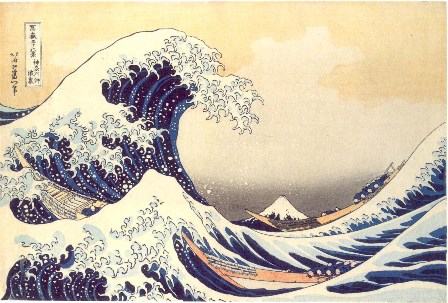
Before the deluge: Hokusai's Great Wave
Is there anybody there?
Gail Brown wonders what might be achieved if we all listened carefully and then spoke with one voice.

Before the deluge: Hokusai's Great Wave
What makes a relationship work? For many people it is similar interests, such as cooking, maybe just eating, adventure – being part of it or watching other people’s adventures on TV – travelling to faraway lands through movies or getting on a plane, train or automobile and living it yourself; sometimes it is just about feeling safe and secure or maybe spending time with friends and family. At the heart of all good relationships we can pretty much rely on a few things:
When we feel as if we’re being listened to but not heard it is difficult to quantify the barrage of emotions that can fill us from the tips of our toes to the ends of our sometimes tear-stained lashes. Like a Hokusai view, wave after wave of restlessness, discourse, upset and nothingness can descend. If you keep saying the same things over and over and over again, and no one is hearing you, then you become a little like the ill-fated Peter, and perhaps even the wolf. When an individual cannot speak anymore we feel misunderstood, as if we have lost our voice, unable to speak out about the things that matter, the things that make us happy, the things that make life good. We are no longer able to effectively communicate.
Egypt, not content with its slice of the historic and cultural pie, has defined what might be the key to change: a single message said by many and repeated over and over and over until it is no longer listened to but it is heard and understood. 2011 is the year of the Egyptian revolution; but why? Why did Egypt become the now proud deliverer of a revolution yet London was witness to what is being labeled as “student riots”? We know the media are our storytellers but why are the ears of two countries so very different and what story would students, the future of this country and many others, have had to tell to be heard?
At the Public Funding for the Arts, House of Lords debate on, 3 February 2011 Lord Bragg told the collection of listeners that “Aristotle lived at a time when creativity and intellectual excellence were seamlessly plaited together, appreciated, and supported. The result was a marvel of dynamic growth. Aristotle believed that the appreciation of art was crucial for the formation of a person’s character and would improve behaviour in society as a whole.” Perhaps at this time when the big society seems like mediocre society with some occasional political catnip smeared across the chests of the Savile Row-suited and Chelsea town-booted, we need to all remember our voice. If it feels like it is the same old, same old, let’s hit “control, alt, delete” and reboot. Let us find our way to the promised land that makes Britain great.
When you’re next chatting with a colleague, a peer or a friend focus whole-heartedly on hearing what they have to say; imagine and wonder how you could make that idea or story leap from the imaginative mind into the realms of reality. Let’s improve society as a whole, together with one message and many voices.
Gail Brown is chair of advocacy and research for the National Association of Local Government Arts Officers
For previous columns by Gail Brown visit the comment page
The Leisure Review, March 2011
© Copyright of all material on this site is retained by The Leisure Review or the individual contributors where stated. Contact The Leisure Review for details.
Download a pdf version of this article for printing